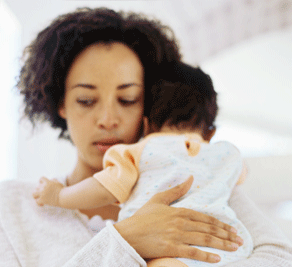 After the birth of a child, women and men feel they should be overjoyed, excited and ecstatic. While these emotions are felt by new parents, they are often jumbled up with negative emotions such as sadness, fear and anxiety. These are very real and normal experiences for all new parents.
After the birth of a child, women and men feel they should be overjoyed, excited and ecstatic. While these emotions are felt by new parents, they are often jumbled up with negative emotions such as sadness, fear and anxiety. These are very real and normal experiences for all new parents.
What comes as a surprise is when the baby blues, which are fleeting moments of crying or mood swings, last longer than a few moments at a time. Postpartum depression is also a very real experience that many new parents are not prepared for. Research has identified at least 28% of Indian American women experience postpartum depression.
South Asian women are at increased risk for developing postpartum depression for several reasons. First and foremost, South Asians families often discourage the open discussion of emotional distress due to cultural stigma against mental health issues. This, coupled with an invalidation of the new mother’s feelings by telling her she “should” be happy, increases the risk of postpartum depression. In addition, not having family nearby for moral and physical support as well as pressure for the husband to return to work both lead to increased feelings of isolation which can exacerbate postpartum depression.
Having experienced depression before the birth puts women at work for developing postpartum depression. Also, after the birth, there is a sharp drop in crucial hormones that regulate mood which can also contribute to postpartum depression. In addition, lifestyle changes to accommodate the demands of a new baby, financial troubles and difficulty breastfeeding are all common risk factors for postpartum depression.
Because the expression and experience of depression is different for South Asians than people from Western cultures, doctors may miss the signs of postpartum depression in South Asian women.Western symptoms of postpartum depression include sadness, crying and moderate to strong mood swings. South Asians may experience any or all of these but are more likely to experience physical symptoms such as fatigue, insomnia, nausea, changes in appetite, headaches and backaches that cannot be attributed to physical causes.
Women who suffer a miscarriage are also at risk for postpartum depression because they also experience the same drop on hormones. In addition, the loss can add a layer of grief, which if not dealt with properly, can result in depression as well. Postpartum depression can begin within a few weeks of the birth to as late as one year after the birth or the end of a pregnancy. Men can also experience postpartum depression and are especially likely to do so if their partners are depressed as well.
Postpartum depression is real and is not a sign of weakness. It is a very common and treatable condition that should be addressed as soon as symptoms are recognized. Untreated postpartum depression can have lifelong impacts on the mother’s health as well as negative effects on the emotional development of the new baby.

